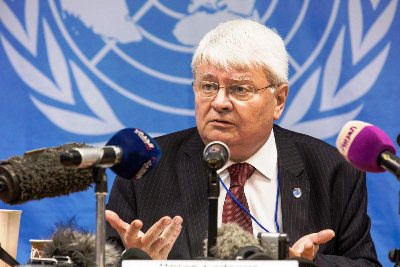Sudan summons UNAMID’s chief over UN report on Darfur
June 19, 2016 (KHARTOUM) – Sudan’s Ministry of Foreign Affairs on Sunday has summoned the head of the hybrid peacekeeping mission in Darfur (UNAMID) Martin Uhomoibhi over the recent joint report on the situation in Darfur that has been submitted to the UN Security Council on June 8th.

It pointed out that Uhomoibhi underscored the improvement of the situation in Darfur and said that “by virtue of his position as head of the UNAMID he represents the primary source of facts and information about the security, humanitarian and political situation in Darfur”.
Last Tuesday, UN peacekeeping chief Herve Ladsous briefed the UN Security Council on the outcome of a recent assessment of the situation in Darfur and of progress made towards the implementation of the UNAMID benchmarks for the period of 1 July 2015 to 15 May 2016.
The contested report provided an analysis of military and police components, and presented recommendations on how to improve the operational effectiveness of UNAMID as well as an update on the status of tripartite discussions on the exit strategy of the mission among the AU, UN and Sudan’s government.
Ladsous said the sectarian violence emanating from disputes over access to land, water and grazing areas remained a major cause of insecurity in Darfur.
“While direct clashes between the government and armed movements had subsided, fighting with the Sudan Liberation Army/Abdul Wahid (SLA/AW) in Jebel Marra, which rejects any negotiations with the Sudanese government, has continued,” he said.
He pointed out that as many as 2.6 million people remain displaced across Darfur.
The Office for the Coordination of Humanitarian Affairs (OCHA) reported 80 000 verified displaced persons since the resumption of fighting in Jebel Marra in mid-January.
“Up to 127 000 displaced persons were yet to be verified. Further, 1.6 million civilians continue to reside in some 60 camps for internally displaced persons (IDPs) in the region” he added.
The report stressed that the current security conditions in Darfur are not conducive to a large-scale return of IDPs to their places of origin.
It added that UNAMID continued to face considerable challenges in its relations with the Sudanese government, which impeded the implementation of its mandate.
“These included denials of access and freedom of movement, particularly to conflict areas such as Jebel Marra, and denials and delays in the issuance of visas and the clearance of shipment containers at Port Sudan,” read the report.
Given the current situation in Darfur, the assessment concluded that the strategic priorities of UNAMID and their corresponding benchmarks remain valid.
Accordingly, the report recommended the extension of UNAMID’s mandate for another 12 months until 30 June 2017.
However, Sudan’s Foreign Ministry said the assessment contradicts with the report that has been prepared by the tripartite team last month in which the three parties acknowledged the improved humanitarian and security situation in Darfur besides the efforts exerted by the governments of Darfur to achieve tribal reconciliations and to return the IDP’s to their original villages.
Foreign Ministry Under-Secretary Abdel-Ghani Al-Naem told Uhomoibhi that Sudan considers the report of the tripartite team “a key reference for dealing with the UNAMID because it was a product of a joint work between Sudan, UN and AU that involved a 10-day field visit to Darfur’s five states”.
The hybrid mission has been deployed in Darfur since December 2007 with a mandate to stem violence against civilians in the western Sudan’s region.
It is the world’s second largest international peacekeeping force with an annual budget of $1.35 billion and almost 20,000 troops.
(ST)
